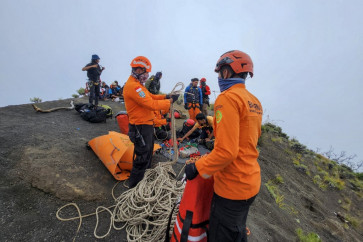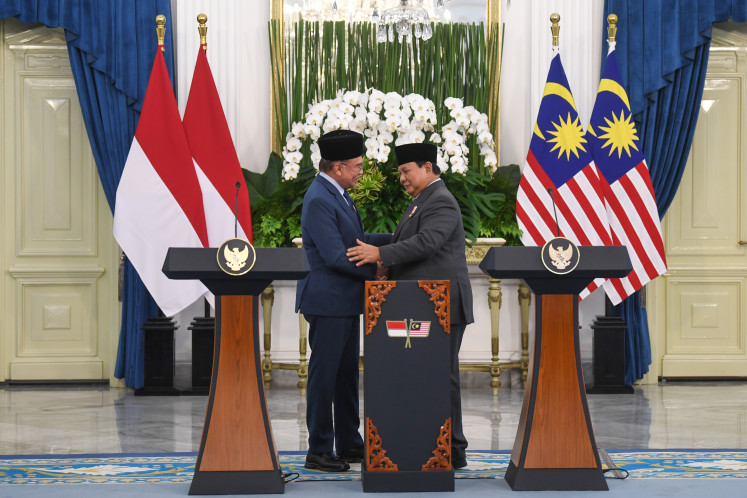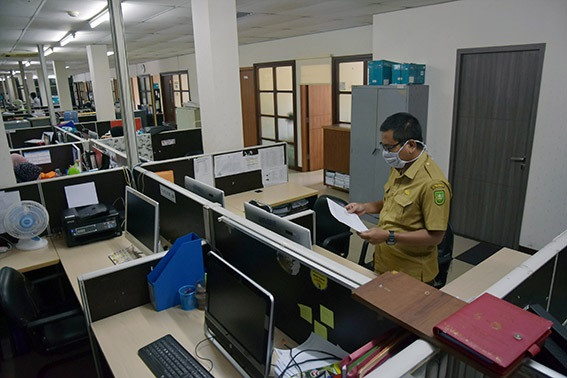Popular Reads
Top Results
Can't find what you're looking for?
View all search resultsPopular Reads
Top Results
Can't find what you're looking for?
View all search resultsMount Kinabalu and cultural (in)sensitivity
Strong earthquake: A helicopter leaves Kundasang, Malaysia for Mount Kinabalu to recover the bodies of climbers on June 6, 2015
Change text size
Gift Premium Articles
to Anyone
 Strong earthquake: A helicopter leaves Kundasang, Malaysia for Mount Kinabalu to recover the bodies of climbers on June 6, 2015. Rescuers on that day recovered the bodies of several more climbers from Malaysia's highest peak a day after it was struck by a strong earthquake. (Munehiro Yamaoka/Kyodo News via AP) (Munehiro Yamaoka/Kyodo News via AP)
Strong earthquake: A helicopter leaves Kundasang, Malaysia for Mount Kinabalu to recover the bodies of climbers on June 6, 2015. Rescuers on that day recovered the bodies of several more climbers from Malaysia's highest peak a day after it was struck by a strong earthquake. (Munehiro Yamaoka/Kyodo News via AP) (Munehiro Yamaoka/Kyodo News via AP)
S
span class="caption">Strong earthquake: A helicopter leaves Kundasang, Malaysia for Mount Kinabalu to recover the bodies of climbers on June 6, 2015. Rescuers on that day recovered the bodies of several more climbers from Malaysia's highest peak a day after it was struck by a strong earthquake. (Munehiro Yamaoka/Kyodo News via AP)
Four hikers'one Dutch, two British, one Canadian'were recently jailed in Malaysia for 'committing an obscene act in public''namely, taking naked photos of themselves at the summit plateau of Mount Kinabalu, at 4,095 metres one of the highest peaks in Southeast Asia and a popular tourist destination. The four'one woman and three men in their early 20s'were part of a group of 10 Westerners who were coming down after the early-morning summit ascent. It was apparently a 'dare' that led them to strip, despite protestations from their mountain guide.
Perhaps the incident would have gone unnoticed, had it not come right before the magnitude-6 earthquake that struck near the mountain on June 5, killing 18 people and devastating the mountain. Officials from Sabah, as well as many in social media, blamed the tourists for the deadly quake, saying their act was sacrilegious, considering that the mountain is regarded as sacred by the Kadazan-Dusun people. The tribe's paramount leader was quoted as saying: 'Whether other people believe this or not, it's what we Sabahans believe. When the earthquake happened, it's like a confirmation of our beliefs. It is a sacred mountain and you cannot take it lightly.'
Later, Malaysian officials criticised the Western media for sensationalising the coverage by suggesting that the accused were charged with 'causing an earthquake.' The officials insisted that the foreigners would have been prosecuted regardless of the deadly quake. Meanwhile, the hikers have pleaded guilty to the offence and apologised for their actions. Said Eleanor Hawkins, 23: 'I know my behaviour was foolish and I know how much offence we all caused to the local people of Sabah. For that, I am truly sorry.'
Arguably, the uproar against such an act was more vociferous in a conservative Muslim society such as Malaysia, but it must be pointed out that the act of stripping in public is an offence all over the world, whether in London, Manila, or Kota Kinabalu. Surely we would also be outraged were some tourists to strip naked at Rizal Park, or the Banaue Rice Terraces.
Just to exhaust all possibilities, however, let us examine certain contexts where nakedness'or nudism'in the outdoors is tolerated, even embraced. In Germany, the first 'clothing-optional' trail opened in 2011, joining the ranks of countless nudist beaches all over the world. This movement is inspired by a classical ethos that views the naked body as the ideal vessel through which to experience bare nature. Of course, the offenders on Mount Kinabalu were in a totally different context. The guide's admonitions should have made it clear that what may be accepted in some secluded trail in Europe won't be received the same way in Malaysia's highest peak. The Filipino expression 'wala sa lugar' (out of place) articulates best this relativity.
The Mount Kinabalu incident also reminds us of people's tendencies to search for explanations after unfortunate events, and that these explanations often engage notions of morality'an idea that dates back to Sodom and Gomorrah. When Reyster Langit, son of veteran broadcaster Rey Langit, succumbed to cerebral malaria in 2005 after doing an assignment in Rizal, Palawan, the Tau't Bato attributed his death to his insistence on entering a cave that they considered sacred. Importantly, however, this kind of thinking is not the province of indigenous peoples alone. In the United States, for instance, some commentators blamed Hurricane 'Katrina' on immorality and homosexuality, among others. Strange things'and strange people'are vulnerable to being the objects of blame because people are always looking for something out of the ordinary to explain another extraordinary occurrence.
Finally, we must realise that social media continually blurs the lines between 'private' and 'public.' Pictures can go viral, and when they do, it is too late to press the 'delete' button'screenshots have been made and circulated all over the world. The immediacy with which we can post pictures can take away the time to reflect on their ramifications, sometimes with devastating effect. For instance, what made the Kinabalu incident 'public' to begin with was the fact that it was photographed and circulated online.
Cultural sensitivity means acting in a way that is acceptable to locals, regardless of whether such actions are 'right' according to one's own perspective. Nakedness on a trail in Germany will not turn heads, but nakedness on Mount Kinabalu'and in most other places around the world'will offend local sensibilities. The spirit of cultural sensitivity does not insist on asking whether things are factual or rational ('Seriously, can an earthquake be caused by people?'), but accepts the feelings and beliefs of others as sufficient basis for one's action. In the second place, cultural sensitivity in our time also involves filtering what we post online, making sure that we do not, post facto, offend the sensibilities of others.
The world is a fascinating place, and visiting other countries and cultures can teach us the valuable lesson of open-mindedness to other ways of life. Documenting ourselves while on the road'or on the trail'is doubtless part of the joy of travelling. We just need to make sure that in whatever way we choose to experience the world, we should always be considerate of locals' feelings and values. Indeed, wherever we travel, as indispensable as our passports and our cameras is a dose of cultural sensitivity.
Gideon Lasco is a physician and medical anthropologist. Visit his website on health, culture and society at www.gideonlasco.com. (hhr)









